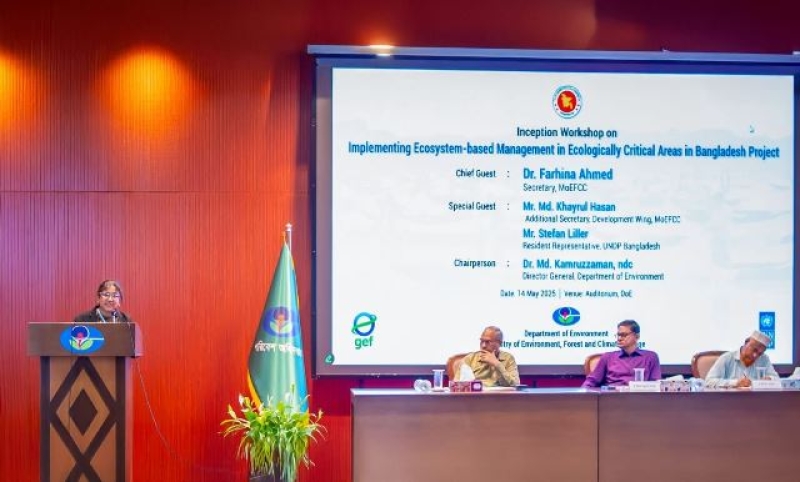- Israel Strikes Tehran with US Support Amid Nuclear Tensions |
- India Sees 9% Drop in Foreign Tourists as Bangladesh Visits Plunge |
- Dhaka Urges Restraint in Pakistan-Afghan War |
- Guterres Urges Action on Safe Migration Pact |
- OpenAI Raises $110B in Amazon-Led Funding |
Biodiversity safety, sustainable ECA management project opens

Inception workshop on Biodiversity safety, sustainable ECA management project held on Wednesday
Dhaka, May 14 – A new five-year project aiming to protect biodiversity and promote sustainable, community-led management of Bangladesh’s Ecologically Critical Areas (ECAs) was launched on Wednesday in Dhaka.
The project, with a total financing of $13.5 million, titled "Implementing Ecosystem-based Management in Ecologically Critical Areas in Bangladesh (EbM-ECA Project)," is led by the Ministry of Environment, Forest and Climate Change (MoEFCC), implemented by the Department of Environment (DoE), with support from the United Nations Development Programme (UNDP) and funding from the Global Environment Facility (GEF), according to a press release.
“This initiative goes beyond biodiversity conservation. It brings together science, indigenous knowledge, and community leadership to restore vital ecosystems while supporting livelihoods,” said Sonali Dayaratne, Deputy Resident Representative of UNDP Bangladesh.
She stressed the importance of multi-stakeholder coordination and environmental governance for the project’s success.
The project will focus on community co-management, innovative restoration practices, and community-led governance models in two biodiversity-rich wetlands—Halda River in Chattogram and Morjat Baor in Jhenaidah—both under pressure from pollution, overuse of resources, and climate change.
Speaking as Chief Guest, Environment Secretary Farhina Ahmed highlighted the potential of ecosystem-based co-management as a replicable model for natural resource management and conservation.
She also acknowledged the GEF’s generous support and reaffirmed commitment to ensuring value for money in the project’s implementation.
The project’s components include ecosystem-based co-management systems, pollution control and water quality monitoring, biodiversity conservation, alternative livelihoods for vulnerable communities, and capacity building for government and local stakeholders.
Aligning with Bangladesh’s National Biodiversity Strategy and Action Plan (NBSAP), the project also supports the Global Biodiversity Framework.
It is expected to benefit over 11,000 hectares of wetlands and directly support surrounding communities. - UNB

